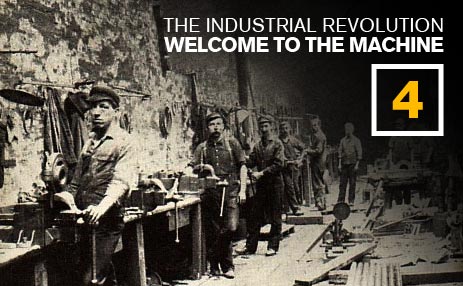Latest
-
Objections to the Christian Faith from the Unchurched and De-Churched
 Tue Dec 02, 2014
Tue Dec 02, 2014
by Resurgence -
Craig Groeschel: We Innovate for Jesus
 Tue Oct 14, 2014
Tue Oct 14, 2014
by Resurgence -
Mark Driscoll: Revelation
 Tue Oct 07, 2014
Tue Oct 07, 2014
by Resurgence -
RESURGENCE LEADERSHIP #034: JOHN PIPER, WHY I TRUST THE SCRIPTURES, PART 2
 Tue Sep 30, 2014
Tue Sep 30, 2014
by Resurgence -
Resurgence Leadership #033: John Piper, Why I Trust the Scriptures, Part 1
 Tue Sep 23, 2014
Tue Sep 23, 2014
by Resurgence

Archives
The Industrial Revolution: Welcome to the Machine, Part 4

Church, Shiny and New
The great monument to the Industrial Revolution church would happen when the generation born at the end of the Industrial Revolution, the Baby Boomers, would receive power and modify the remnants of the Agrarian Church. They turned it into a full, humming, efficient church factory—a campus, a massive movement capable of producing and programming disciples on a grand and standardized scale. No longer would the factory necessarily be bleak and uncomfortable. No longer would working conditions be dim. The mall, the centralized center of consumption, and the factory, the massive center of production, would come together in the world of the church. This was now the standardized church with the fullness of creature comforts. It was the glory of the modern world. That megachurch would become all that many have written about. It would adopt even the model and languages of its factory and business forefathers, where the church pastor would behave like a CEO and discipleship would be like assembly lines. They created linear processes. This is not an effort to judge or condemn the mega- or attractional church. They are faithful to their calling. They incarnate. Others may spend time criticizing how well the experiment worked. The pastors of those churches may even write books recognizing their shortcomings. I simply note the history and point out to those inclined to condemn that there is no line of North American evangelical church history without them. There are no continuations, modifications, or reactions without their presence.
Revolution, Un-Revolutionized
The world had changed. The Industrial Revolution had brought with it precision and control. There was a top-to-bottom pyramid structure that would be, by its nature, successful everywhere it could touch, where its power could be diurnally felt. It would be this very strength that would be its undoing, as the world became electronic and limitless, and to have influence meant never even having to touch when things became high-tech. That change would be a great shift, and just as the Industrial Revolution made those who were separated from their Agrarian forefathers very different, it was even more so with those who were born on the other side of the Information Age. They found a brave and new world, and with it new ways of incarnating church. These ways would ultimately invert the previous ways. Control would no longer be the virtue, but would become the very anchor that would not allow progress. If the Industrial Revolution was about standardization, localization, and control, the Information Age was about to demand the exact opposite, and the church would need to understand how it would shift accordingly.